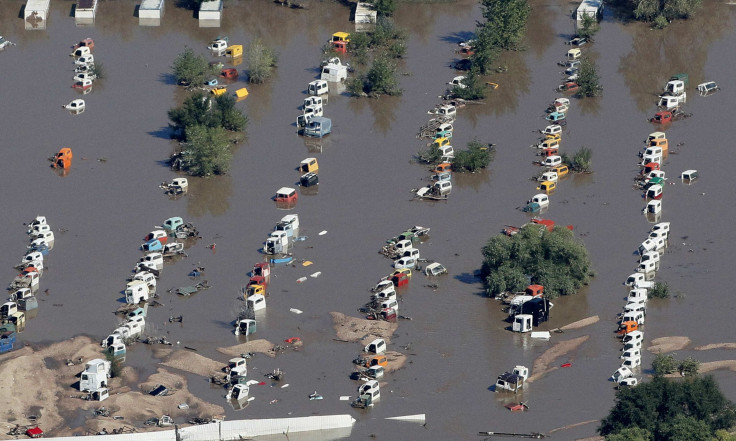Colorado Flood Update: Rescue Teams Searching Remote Communities For Stranded, Unaccounted-For Victims

Rescue teams in Colorado recommenced search efforts on Tuesday for hundreds of residents who are still cut off from roads and power due to flooding so severe that the National Weather Service described it as “biblical.” According to reports, as many as 648 people are still unaccounted for and eight people have died, authorities say.
According to the Los Angeles Times, the number of people unaccounted for substantially decreased over the past few days, but officials are less certain of the number of those who are still waiting to receive help. In a phone call to the newspaper, Liz Donaghey, a spokeswoman for Boulder’s Office of Emergency Management said, “We don’t know many people need help until we get to them.”
She added that “some people chose to stay in Lyons and Jamestown,” two towns turned into veritable islands by the floods. By Tuesday, five days since the start of the downfall, Boulder, Colo., had received more than 17 inches of rain.
“A lot of them are cut off,” Niko King, an agency information officer, told the Times. “You can’t get to them because roads are done.”
King added that not everyone is eager to leave their homes even when rescue does arrive. “They don’t want to go, they have generators, they have food but the infrastructure is gone,” King said, explaining that emergency crews sometimes have to try to convince residents to leave.
According to NBC News, the flooding came from an upper-level low-pressure system that moved up into the Rocky Mountains from Mexico. Research meteorologist Martin Hoerling told the news outlet that “the moisture-laden air was thus moved upwards and forced” to condense “most prolifically” until, eventually, “the moisture kept coming, and the rains kept falling, anchored geographically by the terrain.”
But while monsoon-type flooding is not an infrequent occurrence for the region during summer, meteorologist Bob Henson said that this time of year is usually the driest for Boulder. “What was unusual was that it lasted so long and produced heavy rain over such a large area," Henson said.
Bradley Udall, director of the Getches-wilkinson Center for Natural Resources, Energy and Environment, said that the deluge of water was unlike anything he’d seen in roughly 40 years of living in Boulder.
"It was like living right next to a jet engine ... you could hear the boulders running down rivers at night, which was very eerie, creepy and disturbing,” Udall told NBC News. "I couldn't go to sleep."
"If you would have told me a week ago that we could get 15 inches of rain here in a week, I would have laughed at you," he said. "There is just no analog for this type of storm for this time of year."
© Copyright IBTimes 2025. All rights reserved.





















